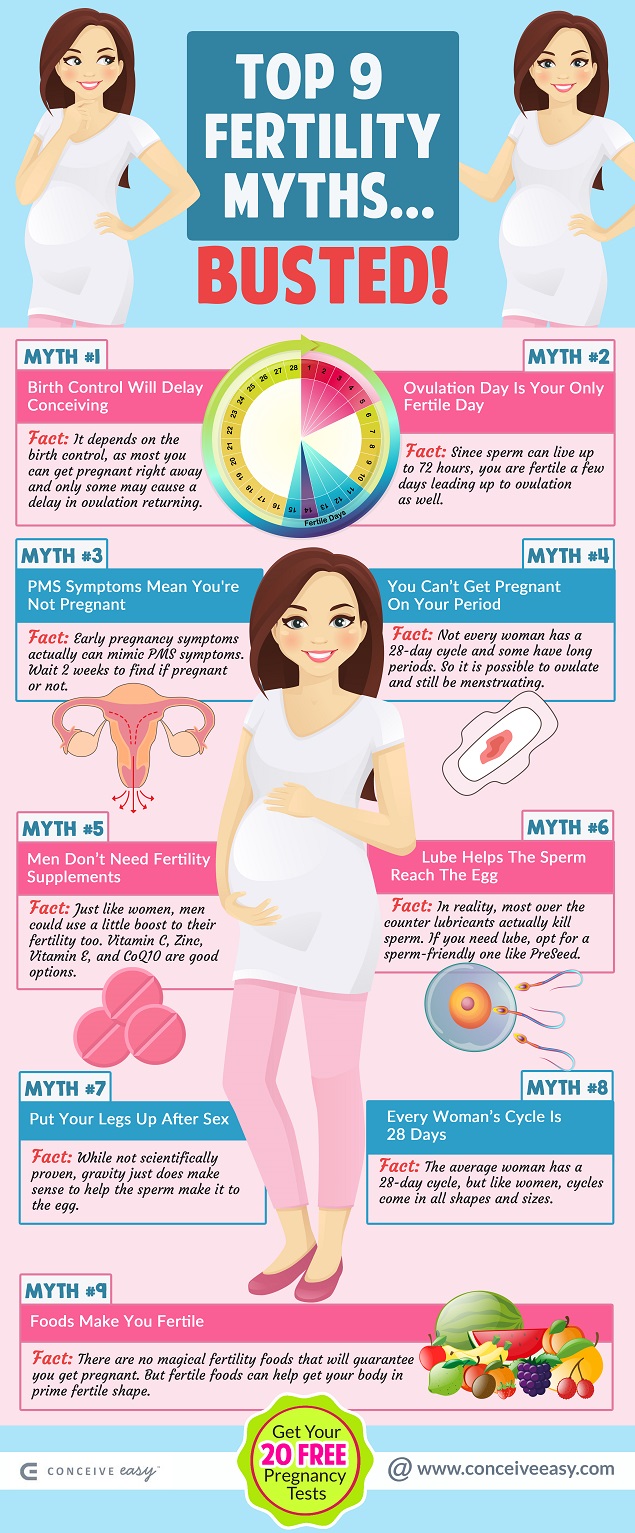![]() The information provided by our expert should not constitute a diagnosis of your condition. Always consult a medical practitioner or healthcare provider for a formal diagnosis. By making use of this content, you agree that ConceiveEasy and the expert assume no liability.
The information provided by our expert should not constitute a diagnosis of your condition. Always consult a medical practitioner or healthcare provider for a formal diagnosis. By making use of this content, you agree that ConceiveEasy and the expert assume no liability.
Back in the “olden” days, talking about fertility was considered taboo. Nobody talked about trying to get pregnant, miscarriage, if they had struggled to get pregnant, or anything even a tiny bit related to fertility. Claim Your 20 Free Pregnancy Tests – Click Here
Fast forward to today, when fertility is an open book topic, and everyone from your next door neighbor to your favorite celeb is willing to dish about their fertility journey.
While this is great for getting the topics of fertility, pregnancy loss, and trying to conceive out there and open for everyone to talk about, this openness surrounding fertility has also led to the prevalence of quite a few fertility myths.
Everyone thinks they are a fertility expert these days, and in some cases, the uninformed are actually spreading around incorrect or inaccurate information, leading to some pretty big fertility myths.
Today, we are going to discuss some of the top fertility myths, and set the record straight once and for all!

True or false? The answer: Maybe, but not always
This one is sort of a myth, but there is actually a little bit of truth to it. It all depends on the type of birth control that a woman has been using. For example, for women who have been using the oral birth control pill, the pill’s ingredients are flushed out of the body’s system pretty quickly. This is why women can get pregnant after just missing a single dose of their birth control pill in some cases. For most women, ovulation will return to normal within two to three months after stopping the oral birth control pill.

For women who have been taking another form of birth control, such as the Depo Provera birth control shot, the hormones in this form of birth control can stick around a bit longer. This is because the birth control shot is designed to only be taken once every three months, so it is set up to last quite a while in the body.
This means it can take a little while for it to be completely removed from a woman’s system. In most cases, women who have taken the Depo Provera birth control shot find that their cycles return to normal within one year of stopping the shot. But some women find they can get pregnant as soon as they miss a shot.
Fertility Myth #1: Busted

True or false? The answer: False.
While this one is mostly true, there are a few things to remember when it comes to ovulation day. First of all, almost every woman has a different cycle, so not all women will ovulate at the same time. It’s super important for women to track their fertile days using an ovulation predictor kit or another method to know when their ovulation day will occur.
Sex on ovulation day is important, since the egg does only live for about 24 hours once it is released. However, there is more to the story than just having sex on ovulation day.
What most couples do not know is that while the egg only lives for around 24 hours after being released, sperm can live for up to 72 hours in the body.
This means that you can give yourself a little bit of a fertility boost by knowing when your ovulation day is expected, and then planning to have sex for a few days before ovulation day. This way, sperm can already be there and waiting for the egg to be released, increasing the chances of fertilization.
Fertility Myth #2: Busted!

True or false? The answer: False.
In fact, this one can actually be the complete opposite! This is because many of the symptoms of very early pregnancy can actually be the same symptoms that many women experience associated with PMS.
After ovulation, a woman’s body will begin to produce more progesterone than normal, which can lead to symptoms of PMS. This means that women can get many of the same symptoms in the time after ovulation, whether or not they are actually pregnant.

The only real way to know? The dreaded two week wait in between ovulation and the time a woman’s period is due, and then either she should start her period or take a pregnancy test to find out if she is expecting!
Fertility Myth #3: Busted!

True or false? The answer: False.
Well, this is true for most women, but not all. It all comes back down to the fact that all women are different and have different cycles that their bodies go by.
For women who have an extremely short monthly cycle, for example, say around 17 to 21 days, and who are prone to having extremely long periods, this could pose an issue. If this is the case, a woman could actually be inside of her fertile window during the time that her period is wrapping up, making it actually possible for her to get pregnant during her period.

It is all a bit confusing, and is all the more reason why women should definitely be using a fertility tracking method to know when their most fertile days actually are.
Fertility Myth #4: Busted!

True or false? The answer: False.
Wrong, wrong, wrong! While it is incredibly beneficial for a woman to take a good quality prenatal vitamin during her trying to conceive journey in order to reduce the risks of birth defects and improve her overall health, men are not out of the woods when it comes to fertility supplements. Men really do need to be just as concerned with their overall health and wellness as women are when they are trying to conceive.
A good quality daily vitamin is usually a good choice for most men. Make sure that it contains folic acid, or choose a separate folic acid supplement, because men need it just as much as women do when trying to conceive.

Also important for fertility? Vitamin C, Zinc, Vitamin E, and Enzyme CoQ10, so make sure that you choose a supplement for your man that includes all of the above. Do not underestimate the importance of a good fertility supplement or daily multivitamin for both men and women when it comes to trying to conceive.
Fertility Myth #5: Busted!

True or false? The answer: False.
Actually, this one is almost completely untrue. While it might sound reasonable that using lubricant would help the sperm swim to the egg better, the opposite might actually be true.
That’s right, before you reach for that lube, consider the fact that many over the counter lubricants actually contain ingredients that can KILL sperm before it even gets anywhere close to reaching the egg.

Regular, over the counter lubricants contain chemicals that can be detrimental to sperm health. They also have a tendency to change the acidity of the vaginal environment, making it very difficult for the sperm to actually swim to the egg.
If you are needing to use a lubricant when trying to conceive, look into some of the newer ones on the market, specifically designed to be “sperm friendly” that not only don’t hurt fertility but actually help it.
One of the most common brands on the market today is called PreSeed and is designed to be okay to use when trying to conceive but it doesn’t come cheap.
Fertility Myth #6: Busted!

True or false? The answer: Maybe.
This one is an old wives’ tale that has been around forever! Visit any “trying to conceive” online message board or Facebook group, and you will see pictures of women with their legs high up in the air after sex, in hopes that it will “help” the sperm to swim towards the egg.
However, this is techically just a myth but I’ve got friends and colleagues who still swear by it. And who’s to say they’re wrong?

The truth of the matter is, we are designed to reproduce, and the sperm know exactly what they are supposed to do in order to get to the egg and fertilize it. The sperm are able to travel through the female body and penetrate the egg just fine on their own, without us women turning ourselves upside down and looking silly!
Of course, if this is something that makes you feel better or that you think is helpful to you, by all means, go for it! It is definitely not hurting anything to do this, and you can do it if you want to!
Fertility Myth #7: Busted!

True or false? The answer: False.
Oh, no, no, no! This one is definitely a popular fertility myth that is out there, but it is far from the truth. While it is true that the AVERAGE menstrual cycle for the AVERAGE woman is 28 days in length, that is by no means true for every woman.
Some women have very short cycles, and some women have extremely long cycles, and all of this can be considered to be normal. Some women even have cycles that vary in length from month to month. Of course, some women who have very long or short cycles can have health issues that need to be checked out, but in many cases, that’s just how it is, and everything is fine!
While the average cycle for women is around 28 days, some women have full cycles that are as short as 21 days long, while others have cycles that are as long as 31 days long, and that is completely and totally fine.
Some women have different lengths of menstrual periods as well, with some women bleeding for as little as two days, to other women who bleed for upwards of seven to nine days. It’s all just an example of how very different all women are, and that you can’t just lump us all together in one simple category!
Fertility Myth #8: Busted!

True or false? The answer: False.
There is so much talk going on these days about fertility diets and whatnot, that we could devote an entire article to just talking about how food affects fertility! While it has been said before that foods like wild yams can help women to get pregnant, the truth of the matter is, there are no “magical fertility foods” that make a woman get pregnant. While these particular things will not help women to get pregnant, they are not really going to hurt their chances either.
When it comes to food, we do have a few things that can affect our overall fertility, but it’s much more simple than just one certain special food to help women get pregnant. For example, cutting out bad foods like fast food, sugary snacks, sodas, cakes and chips, will definitely help a woman improve her overall health, which can go a long way towards helping to improve her fertility. On the other hand, eating too much of these bad for you foods can get your body out of whack and hurt your fertility.

Making sure to eat plenty of fresh fruits and veggies, lean meats and protein, full fat dairy products, and whole grains is the best diet plan for a healthy body and women should really try this as their dietary approach to fertility. (And theory goes that more fruits and veggies ad high fat will help your chances of conceiving a girl!)
Fertility Myth #9: Busted!

As you can see, there are a ton of different fertility myths floating around out there, but not all of them are true. Some of them are completely false and even the opposite of what is actually true. Other fertility myths might have a tiny grain of truth to them, but have been embellished somewhere along the way.
The truth is, there is just so much info floating around out there when it comes to fertility and pregnancy that it can be hard to keep it all straight. If you do happen to have questions related to pregnancy, fertility, or trying to conceive, definitely take those questions to your doctor or another reputable source, and be careful with info and advice that you get from friends and of course, the internet.
You can get conflicting information very easily this way, so make sure you do your research to know what is true and what is not! It can be very difficult to know what is myth and what is fact, but the truth is out there, sometimes you just have to search for it a little bit!











Comments